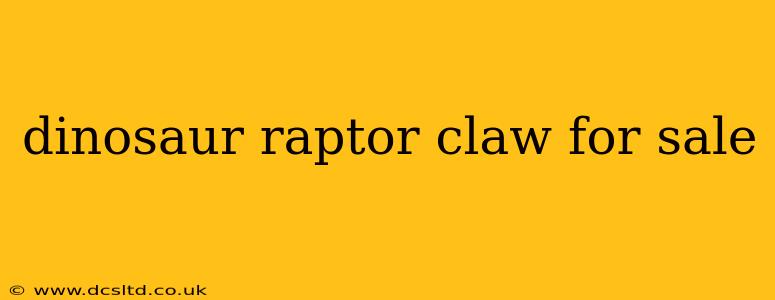The allure of owning a piece of prehistoric history is undeniable, and dinosaur fossils, especially those as striking as raptor claws, are highly sought-after items. However, navigating the market for dinosaur fossils requires caution and knowledge. This guide will help you understand what to look for when considering a dinosaur raptor claw for sale, ensuring you make an informed and potentially rewarding purchase.
What Types of Raptor Claws are Available?
Several different types of raptor claws are available on the market, each with its unique characteristics and value. These often vary based on the species of dinosaur, the claw's size and condition, and where it was found. The most famous, and often most sought-after, come from species like Velociraptor and Deinonychus. However, claws from other dromaeosaurid dinosaurs are also frequently offered for sale. The differences can be subtle, so it's crucial to understand the specific characteristics of the species you're interested in.
How Can I Tell if a Raptor Claw is Real?
Authenticating a dinosaur fossil, especially one as desirable as a raptor claw, is paramount. Unfortunately, the market for fossils also includes many fakes and reproductions. Here's what to consider:
-
Documentation: Reputable sellers will provide detailed provenance information, including the location of discovery, the geological formation it was found in, and ideally, permits and documentation associated with its excavation and legal sale. Lack of such documentation should raise serious red flags.
-
Scientific Analysis: A truly valuable and authentic claw may have undergone scientific analysis. This may involve dating techniques or detailed study by paleontologists, and some sellers may offer certificates of authenticity from reputable institutions. However, be wary of certificates from unknown sources.
-
Physical Examination: Examine the claw closely. Real fossils will often show natural imperfections, weathering, and signs of mineralization. Perfectly smooth or overly pristine claws are often suspect. Look for signs of matrix (the surrounding rock) still attached—this can be a strong indicator of authenticity.
-
Material Composition: Real dinosaur fossils are composed of fossilized bone, often with a specific mineral composition. A qualified gemologist or paleontologist could perform tests to verify this.
What is the Price Range for Dinosaur Raptor Claws?
The price of a dinosaur raptor claw for sale is highly variable, depending on several factors:
- Species: Claws from more well-known species like Velociraptor command higher prices than those from lesser-known genera.
- Size and Completeness: Larger, more complete claws are naturally more valuable.
- Preservation: Well-preserved claws with minimal damage fetch higher prices.
- Provenance: Claws with clear and well-documented provenance will generally sell for more.
Smaller, less complete claws might range from a few hundred dollars to several thousand, while exceptional specimens could fetch tens of thousands, or even more, at auction.
Where Can I Buy a Dinosaur Raptor Claw?
Purchasing from reputable sources is critical. Consider these options:
- Reputable Fossil Dealers: Establishments with a long-standing history and positive reputation are usually a safer bet. Research their background and customer reviews.
- Fossil Auctions: Reputable auction houses sometimes offer dinosaur fossils. However, due diligence is still necessary.
- Museums and Scientific Institutions: While you're unlikely to purchase a specimen directly, these institutions might offer information or guidance on authenticating fossils.
Are there any legal restrictions on buying dinosaur fossils?
Yes, the legal landscape concerning dinosaur fossil ownership and trade varies significantly by country and even region. It is essential to ensure that the seller has all the necessary permits and legal documentation before completing any transaction. Some countries have strict regulations or even outright bans on the export or sale of certain fossils. Always confirm the legality of any purchase you're considering.
By carefully considering the points outlined above, you can increase your chances of acquiring an authentic and valuable dinosaur raptor claw while avoiding potential pitfalls and illegal activities. Remember that responsible collecting involves respecting scientific integrity and the preservation of our paleontological heritage.
